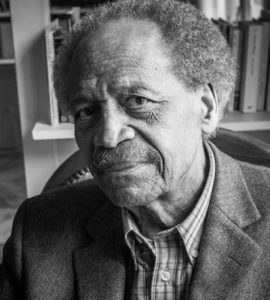
James Emanuel
James Emanuel, a Black poet, educator, and critic, was born on this date in 1921.
Born and raised in Nebraska, he spent much of his early years in the western United States. After working at a variety of jobs, at age 20, he served as Confidential Secretary to the Assistant Inspector General of the U.S. Army, Benjamin O. Davis, Sr. He also taught at the City College of the City University of New York, where he introduced the study of Black Poetry in 1966. He received an invitational Fulbright professorship at the University of Grenoble, France, in 1968 and was awarded a similar position at the University of Warsaw in 1975.
He has edited five Broadside Critics books (1971-1975); earned a Columbia University doctorate; had professorships in New York, France, and Poland; published almost 400-plus poems (in 14 individual books, 145 or more anthologies, and many journals), 32 literary essays, and the now-classic anthology "Dark Symphony: Negro Literature in America," an autobiography, and seminal book on Langston Hughes.
In 1992, Emanuel created a new literary genre, jazz-and-blues haiku, later read often, with a musical background, in Europe and Africa. This effort prompted the Sidney Bechet Creative Award to be given to him in 1996.
In the annals of American poetry, it is hard to picture a more neglected poet than James A. Emanuel. From 1995-2000, he placed nearly 6,000 documents in his The James A. Emanuel Papers in The Library of Congress, Manuscript Division, Washington, D.C. His last book is "The Force and the Reckoning," Detroit: Lotus Press, 2001.
He lived in Paris for more than 20 years. James A. Emanuel published more than a dozen volumes of his poetry. Much of his frustration with racism in the United States helped motivate him to move to France. James Emanuel died on Sept. 28, 2013, in Paris. He was 92.
Image by Godelieve Simons,
Dark Symphony: Negro Literature in America,
ed. with Theodore L. Gross
The Free Press, 1968,
ISBN: 0-02-0909540-9.